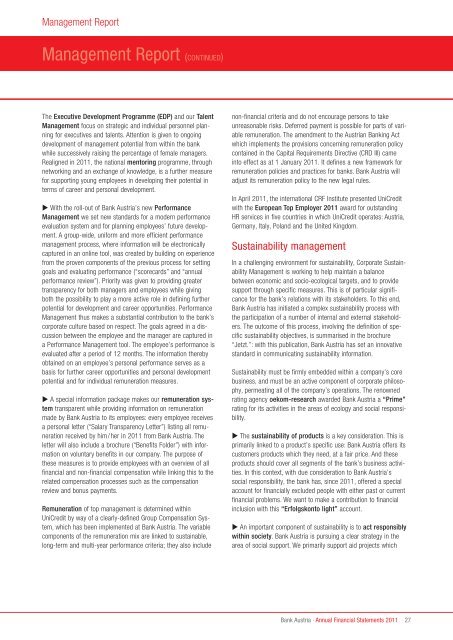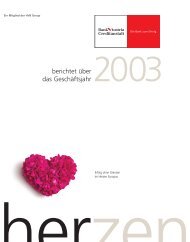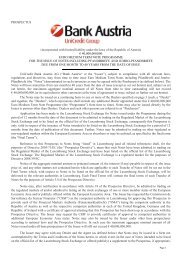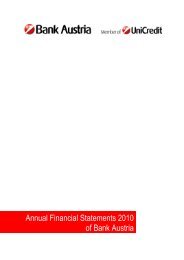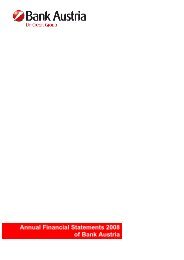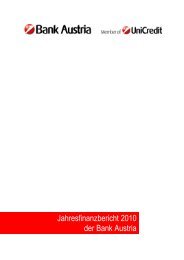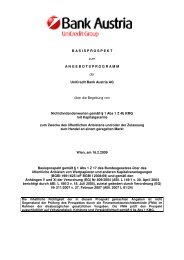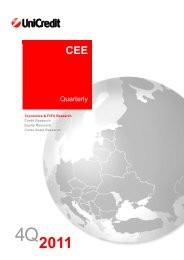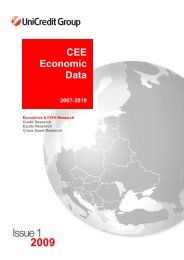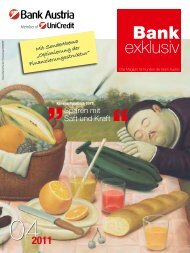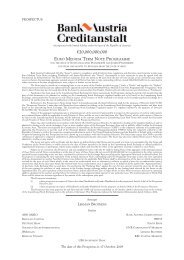Annual Financial Statements 2011 of Bank Austria
Annual Financial Statements 2011 of Bank Austria
Annual Financial Statements 2011 of Bank Austria
You also want an ePaper? Increase the reach of your titles
YUMPU automatically turns print PDFs into web optimized ePapers that Google loves.
Management Report<br />
Management Report (CONTINUED)<br />
The Executive development Programme (EdP) and our Talent<br />
management focus on strategic and individual personnel planning<br />
for executives and talents. Attention is given to ongoing<br />
development <strong>of</strong> management potential from within the bank<br />
while successively raising the percentage <strong>of</strong> female managers.<br />
Realigned in <strong>2011</strong>, the national mentoring programme, through<br />
networking and an exchange <strong>of</strong> knowledge, is a further measure<br />
for supporting young employees in developing their potential in<br />
terms <strong>of</strong> career and personal development.<br />
� With the roll-out <strong>of</strong> <strong>Bank</strong> <strong>Austria</strong>’s new Performance<br />
management we set new standards for a modern performance<br />
evaluation system and for planning employees’ future development.<br />
A group-wide, uniform and more efficient performance<br />
management process, where information will be electronically<br />
captured in an online tool, was created by building on experience<br />
from the proven components <strong>of</strong> the previous process for setting<br />
goals and evaluating performance (“scorecards” and “annual<br />
performance review”). Priority was given to providing greater<br />
transparency for both managers and employees while giving<br />
both the possibility to play a more active role in defining further<br />
potential for development and career opportunities. Performance<br />
Management thus makes a substantial contribution to the bank’s<br />
corporate culture based on respect. The goals agreed in a discussion<br />
between the employee and the manager are captured in<br />
a Performance Management tool. The employee’s performance is<br />
evaluated after a period <strong>of</strong> 12 months. The information thereby<br />
obtained on an employee’s personal performance serves as a<br />
basis for further career opportunities and personal development<br />
potential and for individual remuneration measures.<br />
� A special information package makes our remuneration system<br />
transparent while providing information on remuneration<br />
made by <strong>Bank</strong> <strong>Austria</strong> to its employees: every employee receives<br />
a personal letter (“Salary Transparency Letter”) listing all remuneration<br />
received by him/her in <strong>2011</strong> from <strong>Bank</strong> <strong>Austria</strong>. The<br />
letter will also include a brochure (“Benefits Folder”) with information<br />
on voluntary benefits in our company. The purpose <strong>of</strong><br />
these measures is to provide employees with an overview <strong>of</strong> all<br />
financial and non-financial compensation while linking this to the<br />
related compensation processes such as the compensation<br />
review and bonus payments.<br />
remuneration <strong>of</strong> top management is determined within<br />
UniCredit by way <strong>of</strong> a clearly-defined Group Compensation System,<br />
which has been implemented at <strong>Bank</strong> <strong>Austria</strong>. The variable<br />
components <strong>of</strong> the remuneration mix are linked to sustainable,<br />
long-term and multi-year performance criteria; they also include<br />
non-financial criteria and do not encourage persons to take<br />
unreasonable risks. Deferred payment is possible for parts <strong>of</strong> variable<br />
remuneration. The amendment to the <strong>Austria</strong>n <strong>Bank</strong>ing Act<br />
which implements the provisions concerning remuneration policy<br />
contained in the Capital Requirements Directive (CRD III) came<br />
into effect as at 1 January <strong>2011</strong>. It defines a new framework for<br />
remuneration policies and practices for banks. <strong>Bank</strong> <strong>Austria</strong> will<br />
adjust its remuneration policy to the new legal rules.<br />
In April <strong>2011</strong>, the international CRF Institute presented UniCredit<br />
with the European Top Employer <strong>2011</strong> award for outstanding<br />
HR services in five countries in which UniCredit operates: <strong>Austria</strong>,<br />
Germany, Italy, Poland and the United Kingdom.<br />
Sustainability management<br />
In a challenging environment for sustainability, Corporate Sustainability<br />
Management is working to help maintain a balance<br />
between economic and socio-ecological targets, and to provide<br />
support through specific measures. This is <strong>of</strong> particular significance<br />
for the bank’s relations with its stakeholders. To this end,<br />
<strong>Bank</strong> <strong>Austria</strong> has initiated a complex sustainability process with<br />
the participation <strong>of</strong> a number <strong>of</strong> internal and external stakeholders.<br />
The outcome <strong>of</strong> this process, involving the definition <strong>of</strong> specific<br />
sustainability objectives, is summarised in the brochure<br />
“Jetzt.”: with this publication, <strong>Bank</strong> <strong>Austria</strong> has set an innovative<br />
standard in communicating sustainability information.<br />
Sustainability must be firmly embedded within a company’s core<br />
business, and must be an active component <strong>of</strong> corporate philosophy,<br />
permeating all <strong>of</strong> the company’s operations. The renowned<br />
rating agency oekom-research awarded <strong>Bank</strong> <strong>Austria</strong> a “Prime”<br />
rating for its activities in the areas <strong>of</strong> ecology and social responsibility.<br />
� The sustainability <strong>of</strong> products is a key consideration. This is<br />
primarily linked to a product’s specific use: <strong>Bank</strong> <strong>Austria</strong> <strong>of</strong>fers its<br />
customers products which they need, at a fair price. And these<br />
products should cover all segments <strong>of</strong> the bank’s business activities.<br />
In this context, with due consideration to <strong>Bank</strong> <strong>Austria</strong>’s<br />
social responsibility, the bank has, since <strong>2011</strong>, <strong>of</strong>fered a special<br />
account for financially excluded people with either past or current<br />
financial problems. We want to make a contribution to financial<br />
inclusion with this “Erfolgskonto light” account.<br />
� An important component <strong>of</strong> sustainability is to act responsibly<br />
within society. <strong>Bank</strong> <strong>Austria</strong> is pursuing a clear strategy in the<br />
area <strong>of</strong> social support. We primarily support aid projects which<br />
<strong>Bank</strong> <strong>Austria</strong> · <strong>Annual</strong> <strong>Financial</strong> <strong>Statements</strong> <strong>2011</strong><br />
27


